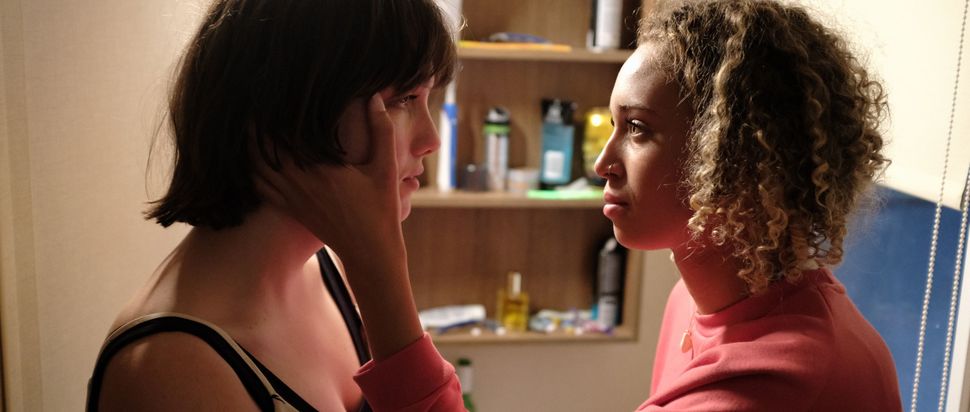Sweetheart: A new kind of coming-out movie
New coming-of-age film Sweetheart is a fresh take on the coming-out drama: it's more concerned with what happens next. Writer-director Marley Morrison and star Nell Barlow discuss the supportive shoot and avoiding the cliches of queer cinema
Sweetheart. The title is fitting: it’s dreamy and nostalgic and somewhat swoon-worthy; but it also makes you wince ever so slightly on the ‘sweet’, and then the ‘heart’ comes, heavy and all too full, over your awkward teen tongue. It’s not one thing – just like its 17-year-old protagonist AJ, and just like the film itself.
Written and directed by Marley Morrison, Sweetheart follows AJ, played by Nell Barlow, on her family holiday to a caravan park. Her family is – somewhat painfully – straight, and AJ is anything but. It’s amid the banality of the holiday that AJ meets Isla (Ella-Rae Smith), just about the most gorgeous lifeguard ever – and AJ is, of course, absolutely smitten.
Sweetheart is Morrison’s debut feature; it is also Barlow’s first lead film role. And so, it’s a film of firsts. “It’s kind of something I feel like we did together,” Morrison says. "We supported each other. And she put a lot of confidence in me, which I’m very, very grateful for; and, respectively, I put my trust in her." There is an intergenerational support here: not merely between Morrison and Barlow, but in the film itself between AJ and her mother Tina, played by Jo Hartley.
Barlow echoes this mutual support that Morrison speaks of. “[Morrison] just completely took me by the hand – she actually used to do that, literally, on set. When she wanted you she just held your hand, and she’d kind of pull you in.” And this intimacy – between writer/director and actor – is palpable on screen. It’s in the closeness we feel to young AJ. Her awkwardness, her pain, her confusion: it’s all there, played out in these – somehow unmissable – subtleties.
This intimacy with AJ is one Barlow feels herself. “I found it quite sad actually because it feels very lonely and then you – this sounds very naff – you think about AJ feeling lonely and…” She trails off as her face falters. “You felt sorry for the person that is experiencing that.” Finding oneself in those teen moments once more – that intensity of emotion, ever brimming beneath the surface – is a state that is both surreal and all too real.
The film is partially inspired by Morrison’s own experience growing up, often spending her family holidays in caravan parks. But AJ – unlike Morrison – is growing up with social media, in an age where queerness is “semi-OK now”. This was the challenge for Morrison: to bring her own self and her own story under a Gen Z lens, without creating something out of touch and unrealistic. “I think there’s an element of me remembering how much of a pain in the ass I was,” she admits. “But then, alongside that, there’s the social anxiety I experienced, and realising that you’re something but not quite knowing how to navigate that.”
AJ grapples with this something-ness. Barlow describes this teenage state that AJ knows all too well: “You’re very self-righteous, you’re very opinionated about certain things and you have to, in a way, divorce your family to then come back to them.” This awareness that AJ gains demands a separation before a later unity. The portrayal of the struggle in reaching that point is partly what makes the film so real: how do you gain that necessary separation when your family are around every corner of a Dorset caravan park?
But bringing to life the character of AJ was also a point of catharsis, at least for Morrison. “A lot of my stuff has dealt with identity and things like [that] – I feel like this film was my way of putting all of that to bed. I think you can spend a long time obsessing over certain aspects of your personality and your past,” she says.
It was also a process of rewriting the queer canon for the next generation. Morrison realised that “a lot of the films with queer characters I was watching as a teenager seemed to be rooted in a lot of trauma.” Sweetheart was about rectifying this. Pain is important – but it’s not all that the queer community experience. There is joy and heartache and boredom, and not everything ends in death or destruction. AJ’s family aren’t homophobic: they love AJ and are simply trying – and sometimes failing – to find the best way to express that love.
For Morrison, looking beyond the conventional queer storylines was vital: “Deliberately the film wasn’t a coming-out film: it was a what-happens-next film.” Coming-of-age is not confined to coming out. It’s refreshing to see.
Down to the very narrative itself, Sweetheart subverts expectations. “It’s constantly shape-shifting – sometimes they’re laughing together and sometimes they're really cross with each other, and it doesn’t really matter what the order is particularly,” Barlow says. “And I think that’s very honest.”
Sweetheart has its world premiere at Glasgow Film Festival 2021, screening 3-6 Mar
